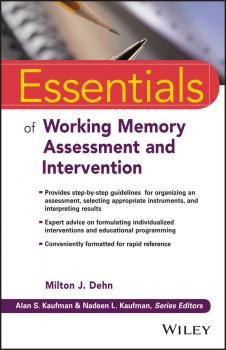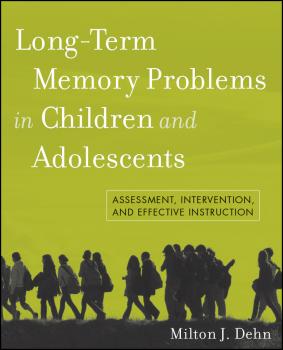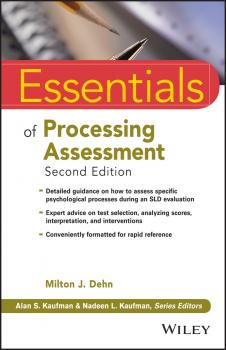ТОП просматриваемых книг сайта:
Milton Dehn J.
Список книг автора Milton Dehn J.Аннотация
Improve academic learning outcomes with accurate working memory assessment and evidence-based interventions Essentials of Working Memory Assessment and Intervention is an accessible, practical guide to accurately and efficiently assessing working memory. This comprehensive resource explains the theories of working memory, with an emphasis on cognitive load theory, and provides step-by-step guidelines for organizing a cross-battery assessment, selecting appropriate instruments, interpreting results, and formulating individualized interventions and educational programming. In-depth case studies illustrate typical profiles found in children and adolescents with working memory deficits, and the companion CD features worksheets, testing charts, and other useful resources. Reader-friendly design elements including Rapid Reference, Caution, and Don't Forget boxes, and practice questions, bullet points, and icons make this guide useful for both study and desk reference. Working memory deficits are the main reason why students with disabilities are unable to successfully respond to regular education interventions. Given the strong relationship between working memory and all areas of academic learning, a deeper understanding of working memory and the related assessments and interventions can facilitate greater achievement. This book helps readers: Understand the development and neuroanatomy of working memory Learn techniques for improving working memory in the classroom Examine strategies for brain-based working memory training Effectively utilize working memory assessment measures By examining the critical functions of working memory and its relationship with specific learning disabilities, then providing strategies for assessment and detailed intervention guidance, this book helps educatorsand professionals guide their students and clients toward improved cognitive functioning, , reduced frustration, and improved academic performance . For those seeking a practical approach to working memory, Essentials of Working Memory Assessment and Intervention provides the tools and information they need.
Long-Term Memory Problems in Children and Adolescents. Assessment, Intervention, and Effective Instruction - Milton Dehn J.
Аннотация
“This book will be a valuable resource for psychologists and educators who work with children or adolescents who are having difficulties with memory and learning. Translating theory and research into practice is a talent that Dr. Dehn possesses and we will benefit from his professional skills.” – From the Foreword by Daniel C. Miller, PhD, ABPP, ABSNP, NCSP An indispensable guide that examines the effect of long-term memory functions on children's learning Long-Term Memory Problems in Children and Adolescents: Assessment, Intervention, and Effective Instruction is the first book of its kind for psychologists, school psychologists, and special education teachers who need an overview of long-term memory as it relates to learning and education. It presents the best practices for assessing long-term memory functions, as well as selecting and using evidence-based instructional practices with memory-impaired students. This useful and timely guide bridges theory and practice to provide professional guidance with coverage of: Risk factors that can lead to long-term memory impairments How long-term memory relates to other types of memory The subcomponents and processes of long-term memory and how they relate to academic achievement What is known about the neuroanatomy of how memories are formed The developmental trajectory of memory and learning Common types of memory dysfunction Memory assessment strategies, interventions for memory problems, and instructional practices that support memory Author Milton Dehn draws on his extensive experience as a trainer and workshop presenter, school psychologist, and educator to present both the theory and research on long-term memory in children and adolescents in this book. Specific step-by-step guidance and hands-on case studies enable professionals to identify how memory can be assessed as well as the interventions that can be linked to the results of the assessment.
Аннотация
A hands-on memory-training program for children and adolescents featuring dozens of practical, evidence-based memory exercises A practical workbook designed to assist students whose academic learning is suffering due to a memory deficit or ineffective utilization of their memory capabilities, Helping Students Remember provides numerous strategies and methods to strengthen memory, including chunking, organization, keyword, self-testing, pegword, loci, and mnemonics. Drawing on the author's extensive training and experience, this useful resource presents effective techniques and lessons on: How memory works Memorization methods Goals for improving memory Repetition Using cards to build memory Grouping words by category Study skills that help memory Using arithmetic to build memory Using music to remember Improving recall during tests Creating and using review sheets Picturing verbal information Using context cues Plans for using memory strategies With an accompanying CD containing all of the worksheets and word lists for reproduction, Helping Students Remember is the first workbook of its kind for general psychologists, school psychologists, and special education teachers, offering practical, easy-to-implement, and evidence-based methods for working with children with memory impairments.
Long-Term Memory Problems in Children and Adolescents. Assessment, Intervention, and Effective Instruction - Milton Dehn J.
Аннотация
“This book will be a valuable resource for psychologists and educators who work with children or adolescents who are having difficulties with memory and learning. Translating theory and research into practice is a talent that Dr. Dehn possesses and we will benefit from his professional skills.” – From the Foreword by Daniel C. Miller, PhD, ABPP, ABSNP, NCSP An indispensable guide that examines the effect of long-term memory functions on children's learning Long-Term Memory Problems in Children and Adolescents: Assessment, Intervention, and Effective Instruction is the first book of its kind for psychologists, school psychologists, and special education teachers who need an overview of long-term memory as it relates to learning and education. It presents the best practices for assessing long-term memory functions, as well as selecting and using evidence-based instructional practices with memory-impaired students. This useful and timely guide bridges theory and practice to provide professional guidance with coverage of: Risk factors that can lead to long-term memory impairments How long-term memory relates to other types of memory The subcomponents and processes of long-term memory and how they relate to academic achievement What is known about the neuroanatomy of how memories are formed The developmental trajectory of memory and learning Common types of memory dysfunction Memory assessment strategies, interventions for memory problems, and instructional practices that support memory Author Milton Dehn draws on his extensive experience as a trainer and workshop presenter, school psychologist, and educator to present both the theory and research on long-term memory in children and adolescents in this book. Specific step-by-step guidance and hands-on case studies enable professionals to identify how memory can be assessed as well as the interventions that can be linked to the results of the assessment.
Аннотация
Step-by-step guidance and the latest research findings on the basics of processing assessment Now in its Second Edition, Essentials of Processing Assessment provides critical information about this important aspect of cognitive functioning. This practical resource provides students and practitioners with the tools they need to accurately and efficiently assess an individual's ability to process information. As part of the Essentials of Psychological Assessment series, this book provides information mental health professionals need to practice knowledgeably, efficiently, and ethically in today's behavioral healthcare environment. Includes illustrative material, callout boxes highlighting key concepts, and «test yourself» question for gauging and reinforcing learning Update throughout to include four new chapters and a new companion CD-ROM that includes all worksheets and testing charts Packed with indispensable guidelines on organizing a processing assessment and interpreting results Essentials of Processing Assessment, Second Edition, offers the best one-stop source of information to help students and practitioners identify processing strengths and weaknesses and plan appropriate interventions.





